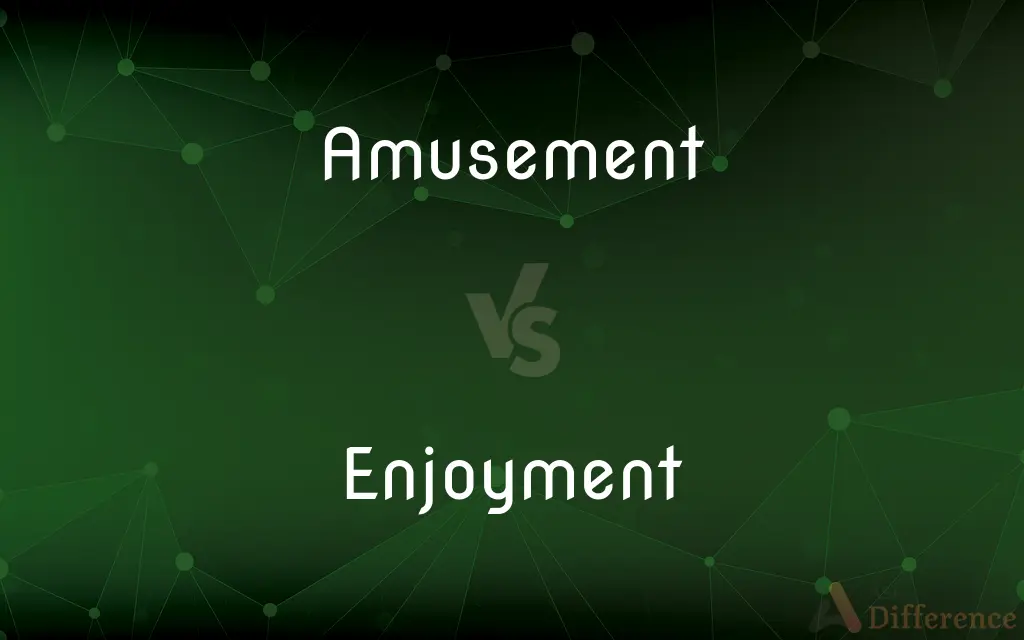Amusement vs. Enjoyment — What's the Difference?
By Tayyaba Rehman — Published on January 2, 2024
Amusement is entertainment causing laughter or light-hearted pleasure; enjoyment is a broader feeling of pleasure, satisfaction, or happiness in an activity or experience.

Difference Between Amusement and Enjoyment
Table of Contents
ADVERTISEMENT
Key Differences
Amusement often refers to a light-hearted and entertaining experience that provokes laughter or diversion, typically involving activities like games, shows, or humorous situations. It's associated with a sense of fun and playfulness. Enjoyment, on the other hand, is a broader term that encompasses any kind of pleasure or satisfaction derived from an experience, whether it's intellectual, emotional, or physical.
The state of being amused usually involves a specific focus on activities or experiences designed for entertainment, such as watching a comedy show or visiting an amusement park. These activities are primarily aimed at inducing laughter or mirth. Enjoyment, however, can be derived from a wide range of activities, including more serene or contemplative experiences like reading a book, enjoying nature, or engaging in a hobby.
Amusement is often associated with a temporary and external stimulus – something that causes you to laugh or feel entertained for a moment. It's more about a reaction to a situation or activity. In contrast, enjoyment is an internal state that can be long-lasting and can come from both external activities and internal states of being, like contentment or fulfillment.
Another key difference is that amusement is often more passive; it's about being entertained by external factors. Enjoyment, however, can be both passive and active – one can enjoy actively participating in an activity as much as passively observing or experiencing something.
Lastly, amusement is often social and shared in nature, arising from interactions with others or shared experiences. Enjoyment, while it can be social, is also deeply personal and can be experienced alone, reflecting individual tastes and preferences.
ADVERTISEMENT
Comparison Chart
Focus
Light-hearted entertainment, laughter
Broad pleasure, satisfaction, happiness
Source
Specific activities for fun
Wide range of activities and experiences
Duration
Often temporary
Can be long-lasting
Nature
More passive and reactive
Can be both passive and active
Social Aspect
Often shared and social
Can be social or deeply personal
Compare with Definitions
Amusement
Entertainment: Providing light-hearted pleasure.
The clown's antics provided great amusement to the children.
Enjoyment
Engagement: Actively engaging in an enjoyable activity.
Her enjoyment in the game was clear from her enthusiasm.
Amusement
Leisure Activity: Enjoyment during free time.
Watching movies is my favorite weekend amusement.
Enjoyment
Fulfillment: Feeling fulfilled or happy.
He derived immense enjoyment from helping others.
Amusement
Laughter: Provoking laughter or mirth.
His witty jokes were a source of constant amusement.
Enjoyment
Pleasure: Experiencing pleasure or satisfaction.
She found great enjoyment in gardening.
Amusement
Diversion: A distraction from serious or mundane tasks.
Playing video games is a popular form of amusement.
Enjoyment
Appreciation: Feeling appreciation or contentment.
His enjoyment of classical music was evident.
Amusement
Playfulness: Engaging in fun or playful activities.
The amusement park was filled with thrilling rides.
Enjoyment
Satisfaction: Feeling satisfied or content.
Cooking offers her a sense of enjoyment and accomplishment.
Amusement
The state of being amused, entertained, or pleased.
Enjoyment
The act or state of enjoying.
Amusement
Something that amuses, entertains, or pleases.
Enjoyment
Use or possession of something beneficial or pleasurable.
Amusement
(uncountable) Entertainment.
To my great amusement, the dog kept on chasing its tail and yelped when it bit it.
Enjoyment
Something that gives pleasure
Classical music was her chief enjoyment.
Amusement
(countable) An activity that is entertaining or amusing, such as dancing, gunning, or fishing.
Enjoyment
(Law) The receipt of the benefits of a property, such as ownership or use.
Amusement
Deep thought; muse.
Here I . . . fell into a strong and deep amusement, revolving in my mind, with great perplexity, the amazing change of our affairs.
Enjoyment
(uncountable) The condition of enjoying anything.
Few activities better the enjoyment of a hearty meal eaten in good company.
Amusement
The state of being amused; pleasurable excitement; that which amuses; diversion.
His favorite amusements were architecture and gardening.
Enjoyment
(uncountable) An enjoyable state of mind.
Amusement
A feeling of delight at being entertained
Enjoyment
(countable) An activity that gives pleasure.
Amusement
A diversion that holds the attention
Enjoyment
(legal) The exercise of a legal right.
Enjoyment
The condition of enjoying anything; pleasure or satisfaction, as in the possession or occupancy of anything; possession and use; as, the enjoyment of an estate.
Enjoyment
That which gives pleasure or keen satisfaction.
The hope of everlasting enjoyments.
Enjoyment
The pleasure felt when having a good time
Enjoyment
Act of receiving pleasure from something
Enjoyment
(law) the exercise of the legal right to enjoy the benefits of owning property;
We were given the use of his boat
Common Curiosities
Can amusement lead to enjoyment?
Yes, amusing activities often contribute to overall enjoyment.
Is enjoyment more personal than amusement?
Yes, enjoyment is often more subjective and personal.
Do people experience amusement differently?
Yes, what amuses one person may not amuse another.
Can one find amusement in everyday activities?
Absolutely, everyday situations can provide amusement.
Can enjoyment be long-lasting?
Yes, enjoyment can be a sustained feeling.
Is enjoyment always associated with fun activities?
Not always; it can also come from serene or fulfilling experiences.
Can solitary activities provide enjoyment?
Yes, many find enjoyment in solitary pursuits.
Is laughter a necessary component of amusement?
While common, amusement can occur without laughter.
Are amusement and enjoyment mutually exclusive?
No, they often overlap and complement each other.
Are amusement and enjoyment cultural?
Yes, cultural factors can influence what we find amusing or enjoyable.
Can work provide enjoyment?
Yes, many find enjoyment in their professional pursuits.
Does age affect what brings amusement?
Yes, different ages may find amusement in different things.
Can mood impact one’s sense of amusement?
Yes, mood can affect what one finds amusing at a given time.
Is amusement always social?
Not always, though it often involves social elements.
Can enjoyment come from intellectual activities?
Absolutely, intellectual pursuits can be very enjoyable.
Share Your Discovery

Previous Comparison
CET vs. GMT
Next Comparison
Search Engine vs. Web BrowserAuthor Spotlight
Written by
Tayyaba RehmanTayyaba Rehman is a distinguished writer, currently serving as a primary contributor to askdifference.com. As a researcher in semantics and etymology, Tayyaba's passion for the complexity of languages and their distinctions has found a perfect home on the platform. Tayyaba delves into the intricacies of language, distinguishing between commonly confused words and phrases, thereby providing clarity for readers worldwide.
















































